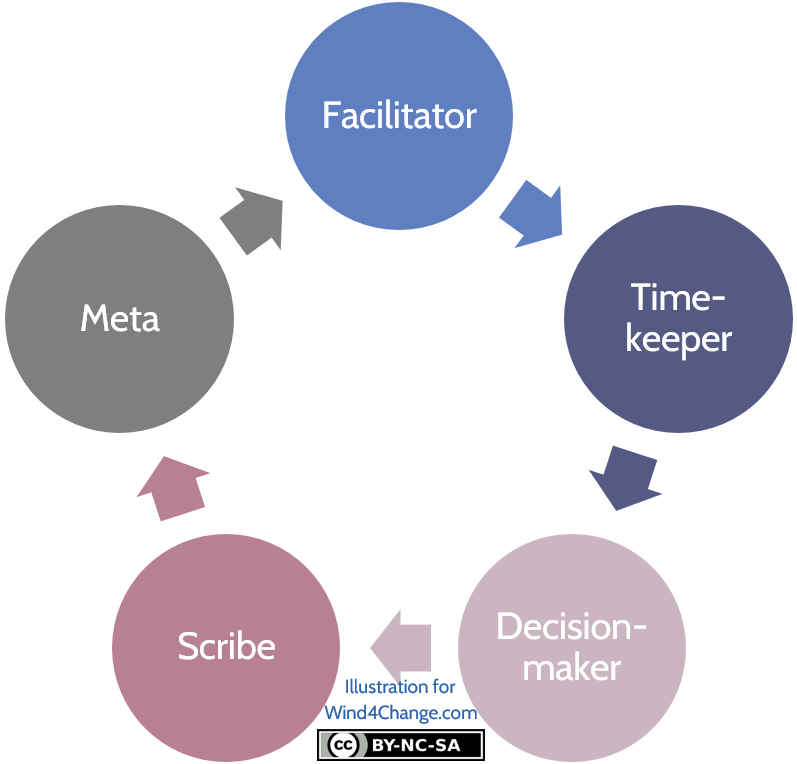What are the principles and benefits of the delegated roles in meeting? Discover the facilitator, the time-keeper, the decision-maker, the scribe and the meta.
- What are the principles and benefits of the delegated roles in meeting?
- What are the 5 delegated roles in meeting?
- What are options with delegated roles?
- What’s next? Learn more about Coaching and discover Change Management
- Do you want to learn more about the delegated roles in meeting? Here are some valuable references
What are the principles and benefits of the delegated roles in meeting?
In one of my coaching that I delivered in English, I shared about the delegated roles in meeting. Furthermore, I wanted to provide additional materials to the team but I could not as all the sources I had and I found were in French. Therefore I decided to write a post on the topic. At this occasion, I discovered that Alain Cardon a senior coach invented the delegated roles in meeting. He is a reference in France regarding coaching and has published many books on this matter.
The delegated roles in meeting, a tool to change and learn for more efficiency and collaboration
To start with, purpose of the delegated roles in meeting is to enable the meeting leader to transfer to participants, roles that consume energy and attention. With this switch, from having one person playing all the roles to a distributed configuration, the success of a given meeting does not rely on a single person.
Second, delegation of these roles and related responsibilities especially supports decision taking. This delegation brings less value in meetings the purpose of which is to share information.
Third, facilitation of meetings with delegated roles promotes the contribution and co-responsibility of the participants. This all the more so that the persons playing the delegated roles change from a meeting to another.
At last, when used on a regular basis, this way of driving meeting changes also the way a team work outside the meetings. It transforms the interactions between the team members but it is as well a way to enforce the meeting best practices. It is a tool for change and learning.
Prerequisites and guidelines for the delegated roles in meeting
- As a prerequisite, there is a need for a management mindset open to delegation and co-decision. In addition, there should be mutual trust within the team.
- Start with topics where the team does not have too much at stake and feels physiologically safe during the discussion.
- The manager role remains non-delegated. When the work group is a team, even if it shares the responsibility of the decisions, the manager remains the ultimate accountable for the decisions. Therefore he/she has the last word with the conclusions.
- All the participants play the participant role and fully contribute to the meeting either delegated or not.
What are the 5 delegated roles in meeting?

The facilitator delegated role
Purpose of the facilitator
- Sets the frame and remind the purpose and the agenda of the meeting.
- Manages the level of energy of the work group in the meeting and ensures the involvement of all participants.
- Usually the facilitator is the person who built the agenda of the meeting.
- Acts like a chief of orchestra.
Activities of the facilitator
- Sets a positive and kind environment to support the quality of the discussion.
- Uses materials (presentation material, paper board) to support the progress of the meeting.
- Ensures that all participants express themselves by encouraging the most shy and tempering the talkative one.
- Pay attention to:
- the focus of the discussion remains on the topics in the agenda,
- the interactions between participants,
- the balance with speaking time,
- the interruptions,
- the people who remain silent.
- Should step back or step in, depending on the need of the discussion to leave room to the others and at the same time to drive the exchange.
- Reformulates the objections or fears heard to ensure that they are understood correctly. And then asks the person concerned what might reassure him or her or make him or her more comfortable.
- When needed, he/she makes deviating participants come back in the meeting frame with a clear and kind reminder.
- The time-keeper and the decision-maker support the facilitator as described below.
The time-keeper delegated role
Purpose of the time-keeper
Helps meeting the agenda or at least being aware of the time slippage.
Activities of the time-keeper
- The time-keeper is the living clock of the meeting and shares on a regular basis like every ten minutes, the time spent and the time remaining for a given part of the agenda. The time of each part of the agenda is explicitly shared at the beginning of the meeting.
- In case of time slippage, the time-keeper will ask the work group if the decision is to move on to the next topic or if additional time should be granted to the topic with the other topic to arbitrate.
The decision-maker delegated role
Purpose of the decision-maker
Pushes decisions to happen in the work group and track them as an input to the meeting minutes.
Activities of the decision-maker
- The decision-maker focus is to make sure that discussions are going somewhere and conclude with decisions.
- He/she pushes the team to take a decision with key questions like:
- Do we get to a decision?
- Can we make a decision on what has just been said?
- Be careful: we have changed the subject without having made a decision.
Once the work group takes a decision he/she reformulates it so it is clear and actionable:
- Clear deadline
- Owner of the action
- Means allocated to support the action
He/she makes sure that the decisions are properly captured in the meeting minutes with deadline, owner and means.
The scribe delegated role
Intent of the scribe
- Records what has been said and decided during the meeting.
- This role can be merged with the decision-maker.
Activities of the scribe
- The scribe is responsible for writing the minutes of the meeting.
- He/she captures the key points, suggestions, concerns and decisions as reformulated by the decision-maker.
The meta delegated role
Intent of the meta
- Enable the work group takes a step back on how the meeting went with good things to keep doing and areas for improvement.
- The meta acts like a mirror to the work group.
Activities of the meta
- Observes meta information, all things you do not see when you are in the play but that highlight issues with the way people interact, unresolved disagreements, past misunderstandings still polluting today’s relationship…
- Then shares kindly the observations and suggest positively possible options.
- Formulates observations as personal, stressing that it is what he/she has observed.
- This implicitly reminds that everybody has bias and that another person could have seen the scene differently.
- Work group should not debate the meta sharing. It is a little bit different than giving a feedback where facts observed are confirmed then only the suggestion is made.
- It is a difficult role to play.
What are options with delegated roles?
If the number of participants is low, roles can be grouped meeting these guidelines:
- Keep the facilitator role separated from the others. It is the most attention demanding role.
- Keep the meta role separated from all other delegated roles. It is difficult to play a delegated role, be part of the game and at the same time take a step back as meta. It is already a challenge to be the meta and an active participant.
What’s next? Learn more about Coaching and discover Change Management
Read my other posts on coaching for instance on trust, feedback and active listening, on the GROW Model and the Powerful questions and on Change Management.
Do you want to learn more about the delegated roles in meeting? Here are some valuable references
Posts:
- A good post on the subject (in French)
- A detailed post from Alain Cardon on the matter (in French)
Books:
- Coaching d’équipe – Alain Cardon (In French)
- Systemic Team and Organizational Coaching – Alain Cardon (In English)
